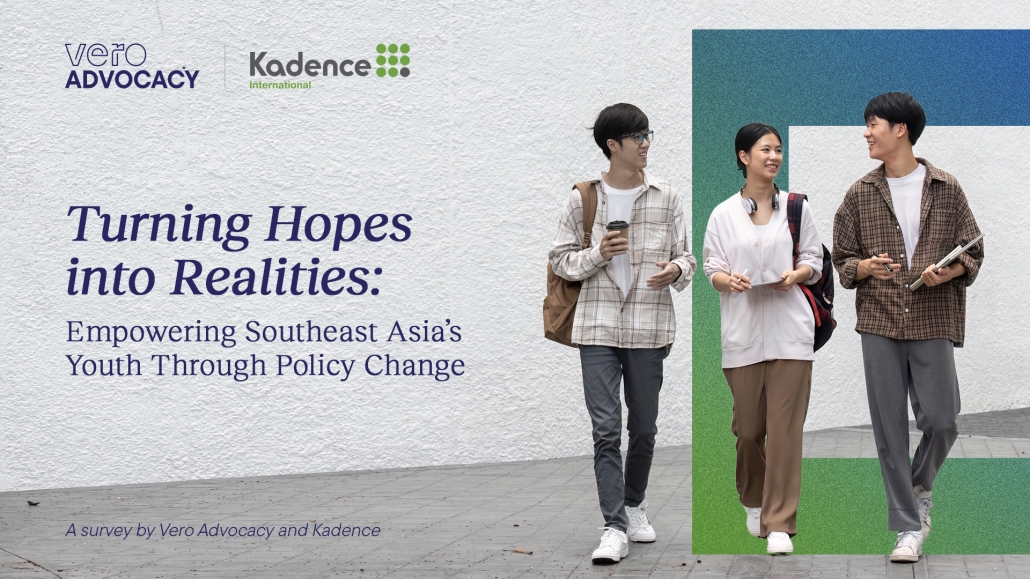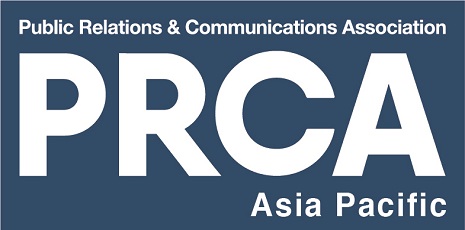A survey by Vero Advocacy and Kadence International reveals that most Southeast Asia’s youth are optimistic yet face employment, education, and housing challenges.

SINGAPORE, NOVEMBER 21, 2024 – Southeast Asia’s youth are anticipating a better future, but this optimism is tempered by a strong demand for urgent reforms in employment, education, and housing policies, according to a survey by Vero Advocacy and Kadence International.
The study surveyed over 2,700 Gen Z and Millennials across Indonesia, Malaysia, the Philippines, Singapore, Thailand, and Vietnam. It explores the shared perspectives of these two generations, uncovering their aspirations and challenges. The findings aim to guide governments and the private sector in developing policies and initiatives that address the needs and expectations of this significant segment of Southeast Asia’s population.
Gen Z respondents are filled with optimism for the future, with 86% of those aged 18-27 expressing confidence in achieving a “much better” or “better” quality of life over the next five years. This optimism is particularly strong in Vietnam (90%) and Thailand (89%), and is driven by Gen Zs’ adaptability, resilience, and eagerness to engage in shaping their future.
In comparison, 81% of Millennials aged 28-43 share a hopeful outlook, reflecting a strong desire for progress and improvement among both generations. Notably, Indonesia stands out as the only country where Millennials are more optimistic about the future, with 89% expressing confidence compared to 87% of Gen Z respondents.
However, this optimism for a better quality of life is accompanied by critical challenges that require urgent attention. The survey identifies the following key issues faced by youth in Southeast Asia:
- Employment Opportunities (Gen Z 76%, Millennials 80%)
With employment consistently ranking as the most significant challenge among Gen Z and Millennial respondents across all markets, many young people feel uncertain about their professional futures. This concern is particularly pronounced in Indonesia, where 88% of Gen Z and 89% of Millennials view employment as a significant issue, and in the Philippines, where 79% of Gen Z and 87% of Millennials express similar concerns. Overall satisfaction rate with employment opportunities stands at only 47%. The lack of opportunities and high competition leave many young individuals feeling trapped in a cycle of uncertainty regarding their career paths.
- Quality Education (Gen Z 58%, Millennials 57%)
Access to quality education raises significant concern among Gen Zs, particularly in Indonesia (73%), Thailand (69%), and the Philippines (65%). Despite this, the average satisfaction rate across all markets is 51%, with Singapore leading at 63%, where respondents view this challenge as the least significant. High tuition costs remain a major barrier to higher education enrollment, hindering students’ ability to gain qualifications essential for competitive job markets. Furthermore, educational curricula often fail to keep pace with the rapid advancements in artificial intelligence, automation, and other technologies.
- Affordable Housing (Gen Z 49%, Millennials 51%).
As young individuals seek independence, affordable housing emerges as a key challenge. For Singaporean Gen Zs, it is the top concern (71%), compounded by the city-state’s high property prices and a satisfaction rate of just 47%. Satisfaction is even lower in the Philippines (31%) and Malaysia (38%), where rising rents and homeownership costs strain incomes. In Thailand, although respondents rated their government’s housing policy at 53%, concerns about affordable housing remain prevalent.
“Employment, education, and housing stand as the most pressing challenges for today’s youth because these are the foundational pillars that support not just individual stability but also collective prosperity,” explained Pongsiri Poorintanachote, Managing Partner at Vero Advocacy. “As Southeast Asia’s youth are poised to drive the region’s future, addressing these challenges is not just beneficial but essential for harnessing their full potential and ensuring a sustainable and inclusive economic growth.”
Additionally, Millennial respondents express significant concern about accessible healthcare (44%), while Gen Zs prioritize environmental protection (also 44%) as a critical issue impacting their future.
With its expertise in government relations in Southeast Asia, Vero Advocacy recognizes the essential link between youth, private stakeholders, and government. By understanding young people’s concerns, Vero Advocacy underscores the need for meaningful engagement and effective responses from governments and companies to create inclusive and sustainable policies and initiatives.
- Youth-Centric Policies – Governments should prioritize initiatives that guarantee access to quality education, expand job opportunities, and improve housing affordability. By focusing on these areas, they can create a supportive environment for young people to thrive.
- Genuine Youth Engagement – It is crucial to involve young people in policy dialogues and decision-making processes. Their insights and perspectives should be actively sought, ensuring that their voices are both heard and valued in shaping policies that impact their future.
- Dedicated Spaces for Youth Advocacy – Establishing dedicated forums or platforms where youth can freely share their advocacy efforts is vital. These spaces should facilitate open dialogue, encourage innovative thinking, and provide opportunities for young individuals to highlight their contributions to national development.
- Support for Entrepreneurs – The private sector should develop entrepreneurial programs that leverage existing resources and expertise. By offering funding and training, businesses can nurture creativity and business acumen, empowering a new generation of innovators and leaders.
- Corporate Social Responsibility – Businesses should embed youth-centric goals into their Corporate Social Responsibility (CSR) strategies, focusing on initiatives that uplift communities and address social issues pertinent to young people. This alignment will foster a more inclusive approach to social development.
“This study sheds light on the significant challenges faced by Gen Z and Millennials, revealing an urgent need for systemic changes to improve access to services and opportunities. Addressing these challenges holistically could lead to substantial improvements in the socioeconomic conditions of the youth and foster a more inclusive and sustainable future for generations to come,” said Ashutosh Awasthi, Director of Kadence International.
Nattabhorn Buamahakul, Managing Partner at Vero Advocacy, added, “Southeast Asian youth are the key force driving our region’s growth. It is crucial for governments and policymakers to recognize their aspirations by actively improving their living standards and opportunities. Our shared future relies on empowering this generation to attain a better quality of life.”
Access the full report for free on the Vero website.
###
ABOUT VERO ADVOCACY
Vero Advocacy specializes in navigating the complexities of government relations and public policy in Southeast Asia. The Vero Advocacy team leverages deep expertise and established connections to advocate for clients’ interests and influence policy outcomes. By bridging the gap between brands and policymakers, Vero Advocacy ensures that clients’ voices are heard, and their positions are effectively represented in the public arena. For more information, visit vero-asean.com.
ABOUT KADENCE INTERNATIONAL
Kadence International is a global market research agency with a radically personal approach. With offices spanning Asia, Europe, the United Kingdom, and the U.S., the company is all about one-to-one connections. From real-time data collection to sharing powerful insights, great research starts with a deep understanding of people and ends with a discovery of game-changing opportunities. Kadence is about people, progress, and passion. For more information, visit kadence.com.
